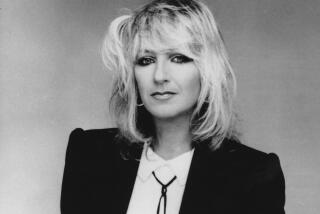Maniacs’ Natalie Merchant Finds Her Way Back to ‘Eden’
- Share via
A few years ago, while touring to promote 10,000 Maniacs’ 1989 album “Blind Man’s Zoo,” the group’s lead singer and songwriter Natalie Merchant noticed something unsettling: She was losing her passion for music.
It was a distressing period for her, she recalled in a West Hollywood hotel room during a recent interview. “There were times when I was on stage that I wasn’t really there,” said Merchant. “My mind was drifting. I could be thinking about my grocery list or wondering where was the nearest Laundromat to the hotel--all this in the middle of singing a song.
“That had never happened to me before. . . . Maybe the fans couldn’t tell, but the passion wasn’t there as much anymore. It scared me.”
She also noticed that she and the band members--bassist Steve Gustafson, drummer Jerome Augustyniak, guitarist Robert Buck and keyboardist Dennis Drew--were clearly drifting apart.
“We didn’t have the time or the patience for each other,” she said. “We were too tired from touring all over in a bus, which we’d done for years and years. Everyone was isolating themselves. We had worked out a way to be together and not be together. We turned our minds off and tuned each other out. It was sad.”
What had happened?
“We just toured ourselves to death--burned ourselves out,” Merchant said. “We pushed ourselves and pushed ourselves, partly because we love to work--but partly for the money.”
For a while Merchant even took this lapse of passion as a sign that she shouldn’t be in the music business anymore. “At one point I seriously thought of going back to college and becoming an elementary schoolteacher,” she said.
Before resorting to drastic measures, the Maniacs decided to take a long break, something they hadn’t done since the band was formed 11 years ago in Jamestown, N.Y. The group, whose new album of ethereal, dark folk-rock is titled “Our Time in Eden,” had maintained a murderous touring schedule since starting with Elektra Records in 1985 with “The Wishing Chair.”
“We took a full year off,” Merchant said. “I wanted to see if relaxing and staying away from performing would rekindle my passion for it.”
It did.
When she reunited with the band to work on the current album, things were different. “It was like this black veil had been lifted,” she recalled. “We loosened up. We wrote together on this album much more than we had before. We got friendly with each other again.”
But some things didn’t change. Merchant, who sings in a dreamy, little-girl voice, is still writing her poetic, enigmatic lyrics the way she always has--in isolation.
“I need to be completely alone when I write,” she explained. “Writing is a strange, tortuous experience. It frustrates me, and I’m best when I’m frustrated. I’m also best when I’m isolated--to a point that I’m so alone I’m talking to myself.
“That’s why there’s some dark themes and stuff about loneliness in some of my songs. I can write music with other people around, but to write lyrics I need to be isolated. I like being miles from the nearest town or store--the nearest anything.”
Did she learn anything from the band’s near-burnout--beside the obvious need to tour less and take regular vacations? Possibly, she replied--a different perspective on performing and its role in her life.
“Without performing, I felt a bit aimless and worthless,” she explained. “For me, being on stage is an emotional release valve. If I don’t do it for a long time, I feel unbalanced. I had to get back to it.
“It’s exciting to be on stage, sometimes so exciting I have a hard time containing my excitement. When things are right, I’m so very open on stage--maybe more open than anywhere else.
“When we took this long break I wasn’t so sure I’d feel that way ever again. But I do feel it again--and I can’t tell you how relieved I am.”
More to Read
The biggest entertainment stories
Get our big stories about Hollywood, film, television, music, arts, culture and more right in your inbox as soon as they publish.
You may occasionally receive promotional content from the Los Angeles Times.










